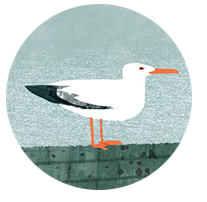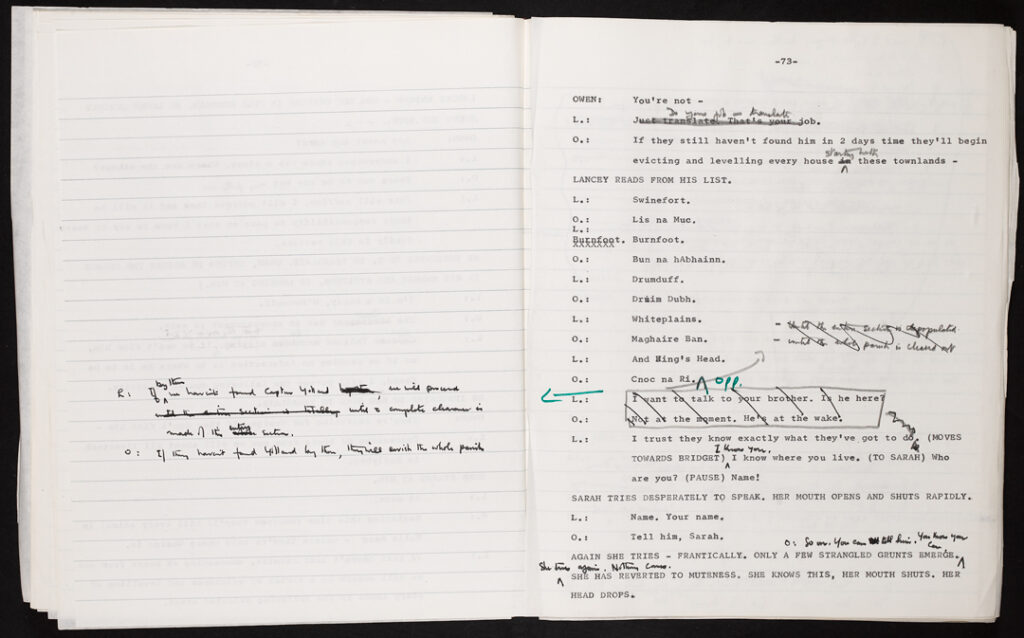
The hedge-school is held in a disused barn or hay-shed or byre. Along the back wall are the remains of five or six stalls – wooden posts and chains – where cows were once milked and bedded. Around the room are broken and forgotten implements: a cart-wheel, some lobster pots, farming tools, a battle of hay, a churn, etc. There are also the stools and bench-seats which pupils use and a table and chair for the master. At the door a pail of water and a soiled towel.
The action takes place in a hedge-school in the townland of Baile Beag/Ballybeg, an Irish-speaking community in County Donegal.
MAIRE: Sweet God, did the potatoes ever fail in Baile Beag? Well, did they ever-ever? Never! There was never blight here. Never. Never. But we’re always sniffing about for it, aren’t we? – looking for disaster. The rents are going to go up again – the harvest’s going to be lost – the herring has gone away forever – there’s going to be evictions. Honest to God, some of you people aren’t happy unless you’re miserable and you’ll not be right content until you’re dead!
![]()
YOLLAND: The day I arrived in Ballybeg – no, Baile Beag – the moment you brought me here, I had a curious sensation. It’s difficult to describe. It was a momentary sense of discovery.
![]()
YOLLAND: I think your countryside is-is-is-is very beautiful. I’ve fallen in love with it already. I hope we’re not too-too crude an intrusion on your lives. And I know that I’m going to be happy, very happy, here.
![]()
LANCEY: Commencing twenty-four hours from now we will shoot all livestock in Ballybeg… If that doesn’t bear results, commencing forty-eight hours from now we will embark on series of evictions and levelling of every abode in the following selected areas… If by then the lieutenant hasn’t been found, we will proceed until a complete clearance is made of this entire section.
OWEN: If Yolland hasn’t been got by then, they will ravish the whole parish.
OWEN: We are trying to denominate and at the same time describe that tiny area of soggy, rocky, sandy ground where that little stream enters the sea, and area know locally as Bun na hAbhann…Burnfoot! What about Burnfoot?
HUGH: The road to Sligo. A Spring morning. 1798. Going into battle. Do you remember James? Two young gallants with pikes across their shoulders and the Aeneid in their pockets…We marched as far as – where was it? – Glenties! All of twenty-three miles in one day.
YOLLAND: Termon, from Terminus, the god of boundaries.
YOLLAND: That’s where my mother comes from – Norfolk. Norwich actually. Not exactly Norwich town but a small village called Little Walsingham close beside it. But in our own village of Winfarthing we have a maypole too.

Original manuscript of Translations
Lis na Muc – Swinefort
Druim Dubh – Dromduff
Machaire Ban – Whiteplains
Cnoc na Ri – Kings Head
Carraig ne Ri
Croc na Mona and the gap
Port
Tra Bhan
Loch an Iubhair
Poll na gCaorach – Poolkerry
Ceann Balor
Lis Maol
Machaire Buidhe
Baile na gGall
Carraig na Ri
Mullach Dearg
Tobair Vree
Carraig an Phoill
Loch na nEan
Machaire Mor
Croc na nGabhar
Tor
Lag
Fair Hill
Dunboy
Green Bank
BRIAN FRIEL: During that period (I am talking about the period prior to attempting the play that became Translations) I made two accidental discoveries. One, I learned that a great-great-grandfather of mine, a man called McCabe from County Mayo, had been a hedge-schoolmaster, had left Mayo and had come up to Donegal where he settled; and it was whispered in the family that he was fond of a drop. That discovery sent me into reading about the hedge-schools in this country and particularly to [P.J.] Dowling’s The Hedge Schools of Ireland.¹
And the second casual discovery I made at that time – this was really shameful but I hadn’t known it until that point – was that directly across the River Foyle from where I live in Muff is a place called Magilligan and it was at Magilligan that the first trigonometrical base for the Ordnance Survey was set up in 1828.²
I began reading the letters that John O’Donovan wrote when he was working for the Ordnance Survey. He was surveying in Donegal in 1835, ‘taking place-names’. O’Donovan appears in the play as a character called Owen.³
BRIAN FRIEL: I think that the versions of Three Sisters which we see and read in this country always seem to be redolent of either Edwardian England or the Bloomsbury set. Somehow the rhythms of these versions do not match with the rhythms of our own speech patterns, and I think that they ought to, in some way… The work I did on Three Sisters somehow overlapped into the working of the text of Translations.4
BRIAN FRIEL: I suppose the play (Translations, the first Field Day Play) has to do with two issues that I think have never been properly resolved in this country. One is the English presence, and the other is the problem of expressing ourselves through an acquired language, and in some way, that is also inhibiting the relationships between this island and England5.
1 May 1979
Mayday. Snowing. Still circling around the notion of the hedge-school/ordnance survey play.
14 May 1979
Went to Urris today, the setting of the hedge-school in the play-in-the-head. No response to the place apart from some sense of how the ordinary British sappers might have reacted to this remote, bleak, desolate strip of land attenuated between mountain and sea. The people from Urris/Ballybeg would have been Irish-speaking in 1833. So a theatrical conceit will have to be devised by which – even though the actors speak English – the audience will assume or accept that they are speaking Irish. Could that work?
17 June 1979
In Ballybeg, at the point when the play begins, the cultural climate is a dying climate – no longer quickened by its past, about to be plunged almost overnight into an alien future.
Original manuscript of Translations
Baptisms
Tongues
The Naming Ritual
Landscapes
Maps
Sticks & Stones
Christenings
Contours
Words
Denominations
Counters
Tokens
Nominations
Entitlements
✭ Postcards of Donegal, Courtesy of Donegal County Museum.
✭ Translations Programme, The Field Day Theatre Company 1980, Courtesy of The Riverside Theatre Coleraine.
✭ Photographs, poster and programme of Translations 1999, Courtesy of An Grianán Theatre.
✭ Translations (1980) by Brian Friel in Brian Friel Collected Plays, Co Meath: Gallery Press, 2016.
✭ 1, 2 &3Brian Friel, Making a Reply to the Criticisms of Translations by J.H. Andrews (1983) in Murray, Christopher (ed.) Brian Friel: Essays, Diaries, Interviews : 1964-1999. London: Faber& Faber, 1999, pp.116 – 118.
✭ 4Brian Friel Talking Ourselves in Magill Magazine, 31 December 1980.
✭ Extracts from a Sporadic Diary (1979): Translations in Murray, Christopher (ed.) Brian Friel: Essays, Diaries, Interviews : 1964-1999. London: Faber& Faber, 1999, p.73 -78.
✭ 5Friel’s Translations at the Gate Theatre 7 October 1980, RTE interview.
National Library of Ireland Collection List No. 73 BRIAN FRIEL PAPERS, MS 37,085 /2 – 3 Hardback copybooks of notes and draft scripts.

An Action of the County Donegal Heritage Plan
© 2024 | Donegal County Council. All rights reserved.